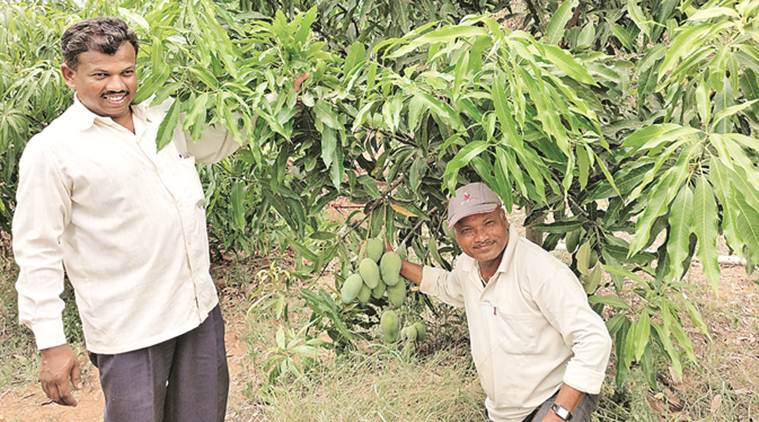
AMID GROWING concerns over agrarian distress, 40 tribal farmers from Peth, a remote tribal area in Nashik district, have come up with a novel way to hedge their losses and make money.
In a region where nearly 90 per cent of the population is tribal, exclusively growing rice, tur and ragi as a means of sustenance, these 40 farmers have floated a self-help group and started growing Jasmine flowers and mangoes of almost every variety on a commercial scale. Apart from using the latest agrarian techniques to improve productivity, the group is also using novel marketing techniques to sell their produce.
The Shrimant Adivasi Bachat Gat Gawanpada, the self-help group, was set up as an attempt to promote traditional and organic farming techniques in the tribal dominated region, which faces perennial water shortages. Rather than limit themselves to sowing the traditionally grown crops in the region, the farmers decided to diversify and sow organic brown rice, Jasmine flowers and mangoes on their land.
The 40 farmers have cumulatively planted around 20,000 Jasmine vines in the villages of Karanjali and Shingdari in Peth taluka — 220 km north of Mumbai. During harvesting time, the flowers are cumulatively collected by the self-help group and one of the farmers takes them to Nashik to sell in the market. The proceeds of the day are then distributed among the entire groups.
Members of the group say that the returns that they get from planting Jasmine vines is substantially higher than the money they used to get when they only relied on traditional crops.
A Jasmine vine, once planted, stays productive for over 12 years. The vines are in bloom for eight months a year whereas harvesting of vegetables is limited to only two months a year. An average vine provides around 100 to 150 gm of flowers each. A farmer can get anywhere between Rs 300 to Rs 1,200 per kg of Jasmine based on the quality of the flower.
The group has also asked its farmers to plant multiple crops on their plots to hedge against any losses. The crops that are grown include organic red rice and mangoes.
Further, the farmers are using farm tourism to sustain their income. This includes holding “all you can eat mango” festivals, where people who visit these farms are allowed to eat as many mangoes they want free of cost. However, if they purchase these mangoes to take back along with them, they have to pay a set price.
“There has been a need for farmers, especially those who are from arid parts of the state, to think of ways to sustain their incomes. I always felt that the sector is doomed until the farming community takes things in its hands and does something out of the box,” said Yashwant Gawande (62), who soon after his retirement as a state transport bus driver, decided to set up the self-help group.
While reading up on various agricultural manuals, Gawande was attracted towards the potential of the mangoes that could be grown in the region. A chance reading of a book on how Israeli farmers were able to pack in a larger number of tress per acre got him thinking on replicating the model in Peth.
The region, which receives 2,788 mm rainfall every year, has climate and soil conditions that resemble Konkan, where mangoes grow in abundance. “We were not undertaking commercial farming of the crop. The Israeli technique showed us that rather than planting two mango trees at a distance of 15 m, which was the conventional way, we could plant them at a distance of only 5 m, thereby planting more trees and improving productivity,” Gawande said.
The Israeli technique had allowed Gawande to plant nearly 700 to 800 mango trees on an acre of land as against 40 to 50 that he could plant earlier.
Gawande also used a technique of planting multiple crops alongside his mangoes to hedge losses in case any of the crops failed. “It is not as if we are making tonnes of money, but by diversifying our crops and using the help of agri tourism, we are able to make decent money. The most important thing is that this method has allowed us to be cushioned against losses if one crop goes bad. I believe that such diversification is necessary for the survival of small farmers,” Suraj Gawande, another farmer in the group, said.